MindHub Analysis — RDR2 (2018)
Red Dead Redemption is apparently about redemption, but whose? The MindHub system is used to track personality over time, so by using it we will see how the profiles of the principle characters of the game change over many hours of game play, and hopefully shed some light on any redeeming qualities we can observe. Let’s look at each character in turn.
https://medium.com/media/fddc841f879973395b0fd941320ba819/hrefFirst up, Arthur Morgan. Arthur is the game’s protagonist, a high-ranking
member of the Van der Linde gang and the player’s avatar for the majority of the story. Arthur is an outlaw trying to find his own path in a changing world. He is a simple man, led by his loyalties. In the first part of the game, one of his primary MindHub drives is Boredom, because he engages in almost all of the gang’s activities, even when he has doubts about them. In MindHub boredom is defined as taking part in too many activities or doing things just because there is nothing better to do. Arthur, for the most part, gives his agency to the will of the group and especially to Dutch, the group’s leader and going along with any schemes. He is also having primary Greed, as he engages in a lot of the activities because of the bounty related to them and shows his love for money. Finally, Arthur also has Lust as he likes
to blow of steam. He enjoys drinking with his friends, often
getting extremely drunk, visits brothels, and sometimes enjoys the action of the crime. Arthur prefers not to “shoot up” places unnecessarily
and doesn’t show hostility to either close people or strangers. After Arthur understands the lethality of his illness, and that he doesn’t have long to live, his profile changes from a quite social and proactive profile to a less social and more internally focused one. Though, for some, it might look like he is
having primary Attachment in attempting to save John from the criminal life, we see that it’s really that Arthur has developed what we call Principles as a primary drive. In the beginning, Arthur trusted in the group rules, one example being that they didn’t kill in cold blood. As his gang became more violent, Arthur began to become aware that this rule mattered to him. He begins to have a conscience. He begins to challenge those around him who
kill out of revenge or anger and is many times told he is “going soft”. Through his dealings with the Native tribe, Arthur also further develops a sense of the fairness or the innate justice of life — he says to many characters that he has lived the life of an outlaw and has been a bad person, so he feels that his death is going to be the death he deserves. He becomes more focused on people around him who are able to redeem their lives earlier since he believes he is beyond the point of redemption himself. In this, he also shows primary Regret, as he is, to some extent, remorseful about the way he chose to live or what he could not change in time. Near the very end of his life he might have been having secondary Attachment as he is willing to sacrifice himself for close ones, though this is dubious as he already knows that he will die before his final fight with Michah to save John. Interestingly, Arthur seems to have a quite peaceful death watching his last sunrise, hinting at either some unseen virtues or a greater force of grace.
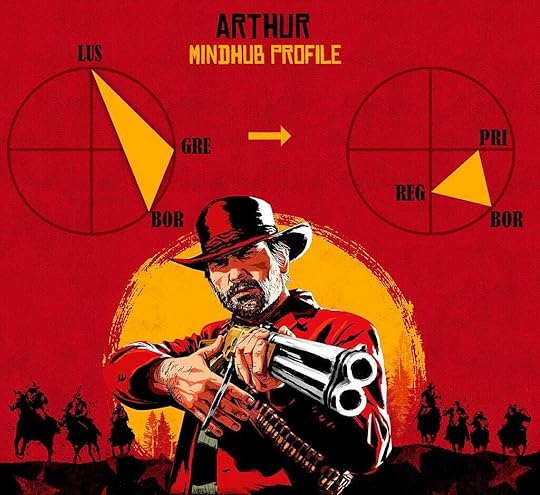
Next, let’s take a look at Dutch Van-der-Linde, the enigmatic leader of the Van-der-Linde gang. Dutch is known for his charisma and questionable
plans. Dutch is a complex character precisely because he is the most authoritative and, at the same time, the most delusional, even in regards
to his own personality. The game mentions briefly in the beginning,
through the mouths of other characters, that he has killed an innocent person and when Dutch is speaking about it he deems it an act of revenge. Contrary to expectation, Dutch is not having primary Revenge drive. In MindHub Revenge means a willingness to carry out a proportional response to aggression, but Dutch goes further. In fact, Dutch saying things about himself which are not accurate to his actual behaviors is evident throughout the story. So what drives does Dutch actually portray? He clearly loves money and he wants more of it. He has primary Greed in the Mindhub system. Unsurprisingly, for the leader of a gang, he also has primary Ego, he wants to be recognized and respected as a visionary and idolized. However, the most prevalent of his drives is Lust, which he has to an extreme degree. Lust in the Mindhub system is about enjoying destructive activity, but in the extreme it becomes carelessness and apathy regarding the consequences of ones’ actions. Interestingly enough, the man who always says “I have a plan” does not actually care about what happens after any given heist as long as the money comes in. This becomes increasingly obvious to the gang members later in the game. Dutch’s character arch is controversial and many players find it complex or baffling. Even the characters in the game are saying that something happened to him that they don’t quite understand or like. But, if we see his drives from the beginning, his arch makes sense. His profile is quite fixed and unchanging but Dutch has such a charismatic presence and way with words that the gang and most players don’t see his real personality until the actual results of the group’s actions are manifest. The other characters see it clearly only when he deserts them during missions where they might have been injured or killed. Dutch really believes he has revenge, but his disappointments particularly after the Guarma fiasco and Hosea’s death, reveal developing Resentment drive instead. The gang members comment that he is enjoying hurting people and in a way that is out of proportion to the situation. Dutch is the provocateur then the executor, strangling the Italian and the old woman, and killing Cornwall on a “social call”. When Dutch is confronted about anything related to his character or lifestyle he doubles down; he speaks like a preacher who worships the idea of the life of the outlaw as a utopian model, and he justifies killing as a necessary
protection of this supposed Utopia. In truth he is becoming desperate because he knows he is obsolete and is holding on too long. He may believe in something, but it may be just words.
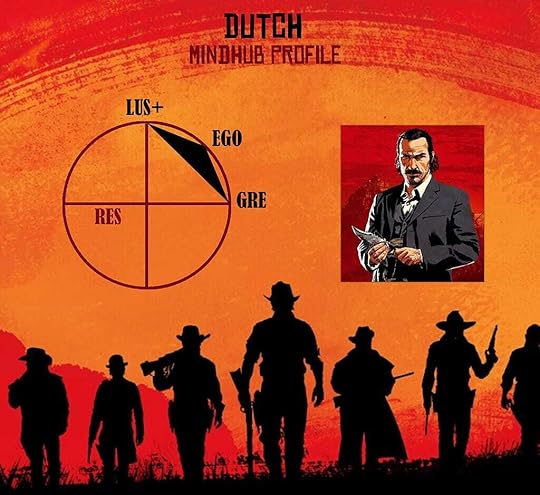
Now for Sadie Adler. She’s a fierce woman who joins the gang after
a tragic event, Sadie becomes a valuable ally to Arthur. Sadie lives through a lot, but doesn’t change much. She has in the beginning the sudden shock of losing everything, her husband and home, and needing to rely on the gang for survival. In the Mindhub system she has primary revenge;
she wants to hit back at the O’Driscolls as much as some other gang members do. She also has primary Resentment, as she blames others in the camp for her feelings of anger or distress. This is evidenced in her fights with the camp cook who she threatens routinely. What might not be obvious from the beginning is Sadie’s primary Ambition. She tells Arthur and others how capable she is of steady work and how much she wants to be able to work alongside the men. She actually is quite capable once they begin to utilize her as a gun. While Sadie may not necessarily redeem herself she does have a subtle arch, which is in starting from a point of total dependence to becoming a real reliable rock for others, from useless to useful.
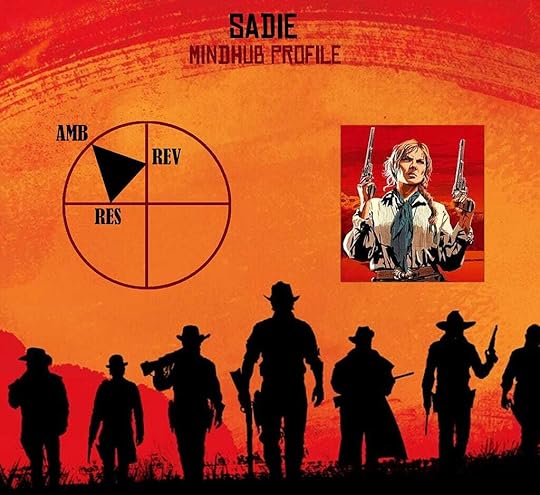
And finally we have Micah Bell, the most hated character in the Rockstar universe. We can profile Micah as a complete character as he does have the necessary drives, but he can also be viewed in a literary sense as an extension of Dutch — the part of him that’s becoming increasingly dangerous and dark and which Dutch chose to keep around and to become more closely allied with. In life, a personality with Micah’s extremes
is statistically rare and would likely have a personality disorder or multiple disorders as well as extreme degrees of dark triad traits, which many people closely associate with the concept of evil. His most obvious drive initially is extreme Resentment, which in the Mindhub system is hate. He treats people abysmally and enjoys inflicting pain both emotional and physical. He has extreme Greed which is shown through his stinginess, and he wants all the money for himself. Similarly to Dutch, he shares extreme Lust, and is compelled by vice, doing jobs that kill many people with apathy for the massacres left in his wake. Micah is insane, and through him we see the level of Dutch’s increasing insanity. If we take the end of the game as the eponymous redemption it is Dutch’s act of choosing to shoot Micah rather than John that might redeem Dutch. In this final scene of the game, Dutch chooses to kill what was essentially the rotten or dark element infecting the gang, and the agent who provided corroboration for Dutch’s extremism and downfall.
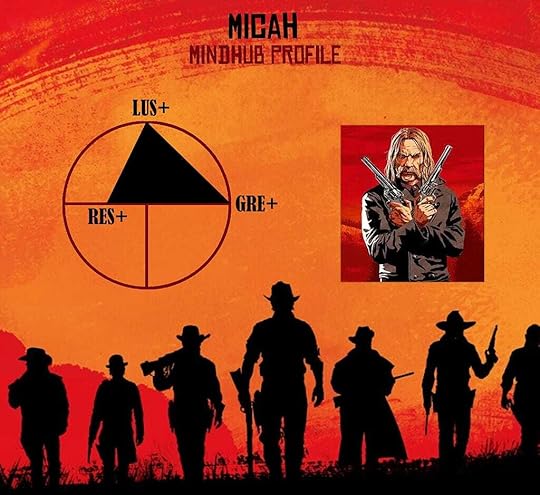
In the end, the characters like ourselves live and die by their choices. Arthur can, through the player’s choices to be honorable or not, garner the understanding or level of self-realization to know the rules of operation of the world, to understand the game. Dutch, increasingly understands the world as well, but refuses to change. In any case, violent men meet violent ends, reflecting the choice to live a nihilistic existence, while honorable people find peace.
To purchase a copy of the MindHub book, search for ‘MindHub Personality Profiler’ in your preferred search engine or check the Amazon link. Any feedback would be greatly appreciated!
Support our work on Patreon and check our updates on X, Goodreads, Instagram, Rumble and YouTube.
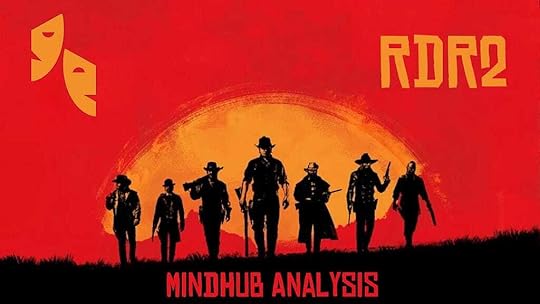 [image error]
[image error]



